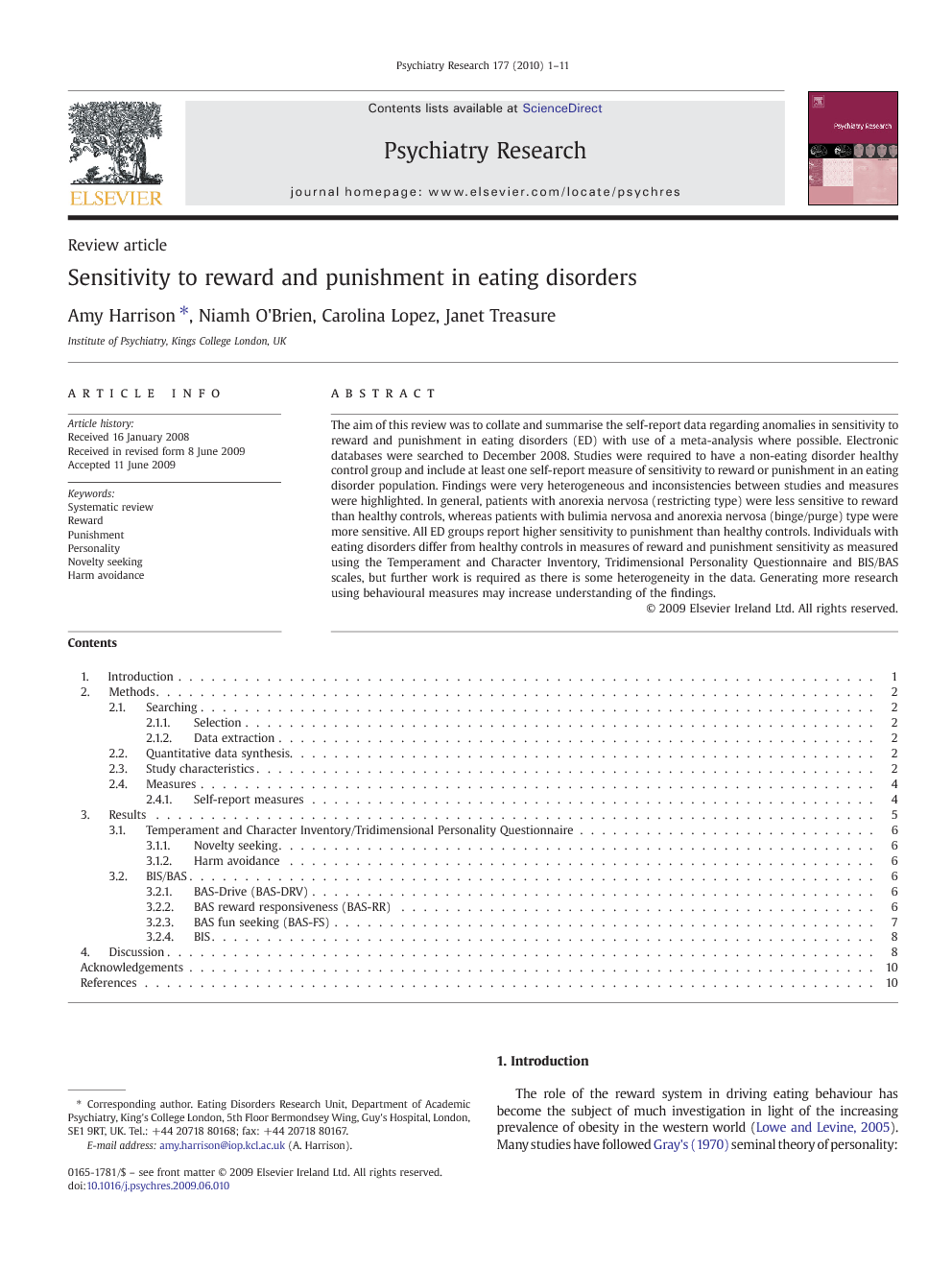The aim of this review was to collate and summarise the self-report data regarding anomalies in sensitivity to reward and punishment in eating disorders (ED) with use of a meta-analysis where possible. Electronic databases were searched to December 2008. Studies were required to have a non-eating disorder healthy control group and include at least one self-report measure of sensitivity to reward or punishment in an eating disorder population. Findings were very heterogeneous and inconsistencies between studies and measures were highlighted. In general, patients with anorexia nervosa (restricting type) were less sensitive to reward than healthy controls, whereas patients with bulimia nervosa and anorexia nervosa (binge/purge) type were more sensitive. All ED groups report higher sensitivity to punishment than healthy controls. Individuals with eating disorders differ from healthy controls in measures of reward and punishment sensitivity as measured using the Temperament and Character Inventory, Tridimensional Personality Questionnaire and BIS/BAS scales, but further work is required as there is some heterogeneity in the data. Generating more research using behavioural measures may increase understanding of the findings.
The role of the reward system in driving eating behaviour has become the subject of much investigation in light of the increasing prevalence of obesity in the western world (Lowe and Levine, 2005). Many studies have followed Gray's (1970) seminal theory of personality: reinforcement sensitivity theory (RST), which involves reward sensitivity, thought to be related to behavioural activation and punishment sensitivity, thought to be related to behavioural inhibition.
Animal studies suggest that reward systems in the brain can become dysregulated by starvation and intermittent access to high palatability food, some of the key symptoms in eating disorders (Avena et al., 2008 and Carr, 2007). Studies in humans have found that binge-eating and purging behaviours are associated with higher sensitivity to reward (Loxton and Dawe, 2001 and Farmer et al., 2001). High reward sensitivity has also been associated with greater activation to food cues in functional magnetic resonance imaging (fMRI) studies (Beaver et al., 2006).
There has, however, been little direct research on measures of sensitivity to reward and punishment in people with eating disorders. Relatively few studies have addressed these constructs using behavioural tasks (Bruce et al., 2003, Bruce et al., 2004, Cavedini et al., 2006, Rosval et al., 2006 and Tchanturia et al., 2007). Studies in anorexia nervosa (AN) using the Iowa Gambling Task have shown that this group tends to perform poorly on these tasks compared to healthy controls, indicating lower sensitivity to reward in the acute state but this effect seems to reverse after recovery (Cavedini et al., 2006 and Tchanturia et al., 2007). Four studies have examined behavioural disinhibition in ED compared to healthy controls using the Go No/Go task and have found that people with binge/purge form of the illness are more disinhibited when faced with punishment than controls (Bruce et al., 2003, Bruce et al., 2004 and Rosval et al., 2006) or when targets are food related (Mobbs et al., 2008). More work has been done to explore these concepts through self-report measures and these data may help to clarify these tendencies.
Due to the scarcity of behavioural studies, it was decided to concentrate on self-report measures in this review and return to the literature on experimental tasks at a later date when more published studies are available.
Understanding how anomalies in the reward and punishment systems might act to cause or maintain eating disorders may lead to more successful interventions for this vulnerable group.
The aim of this systematic review was therefore to collate and analyse the literature on self-reported sensitivity to reward and punishment in people with broad and narrow categories of eating disorders.


